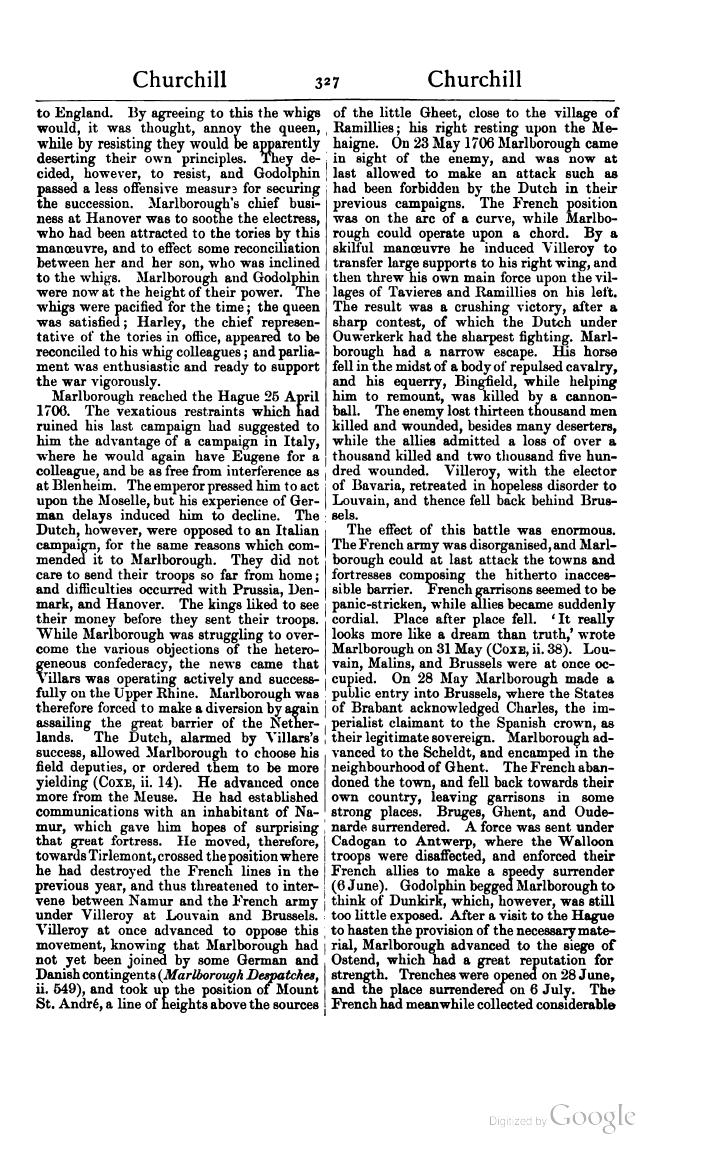to England. By agreeing to this the whigs would, it was thought, annoy the queen, while by resisting they would be apparently deserting their own principles. They decided, however, to resist, and Godolphin passed a less offensive measure for securing the succession. Marlborough's chief business at Hanover was to soothe the electress, who had been attracted to the tories by this manœuvre, and to effect some reconciliation between her and her son, who was inclined to the whigs. Marlborough and Godolphin were now at the height of their power. The whigs were pacified for the time; the queen was satisfied; Harley, the chief representative of the tories in ofiice, appeared to be reconciled to his whig colleagues; and parliament was enthusiastic and ready to support the war vigorously.
Marlborough reached the Hague 25 April 1706. The vexatious restraints which had ruined his last campaign had suggested to him the advantage of a campaign in Italy, where he would again have Eugene for a colleague, and be as free from interference as at Blenheim. The emperor pressed him to act upon the Moselle, but his experience of German delays induced him to decline. The Dutch, however, were opposed to an Italian campaign, for the same reasons which commended it to Marlborough. They did not care to send their troops so far from home; and difficulties occurred with Prussia, Denmark, and Hanover. The kings liked to see their money before they sent their troops. While Marlborough was struggling to overcome the various objections of the heterogeneous confederacy, the news came that Villars was operating actively and successfully on the Upper Rhine. Marlborough was therefore forced to make a diversion by again assailing the great barrier of the Netherlands. The Dutch, alarmed by Villars's success, allowed Marlborough to choose his field deputies, or ordered them to be more yielding (Coxe, ii. 14). He advanced once more from the Meuse. He had established communications with an inhabitant of Namur, which gave him hopes of surprising that great fortress. He moved, therefore, towards Tirlemont, crossed the position where he had destroyed the French lines in the previous year, and thus threatened to intervene between Namur and the French army under Villeroy at Louvain and Brussels. Viceroy at once advanced to oppose this movement, knowing that Marlborough had not yet been joined by some German and Danish contingents (Marlborough Depatches) ii. 549), and took up the position of Mount St. André, a line of neights above the sourcee of the little Gheet, close to the village of Ramillies; his right resting upon the Mehaigue. On 23 May 1706 Marlborough came in sight of the enemy, and was now at last allowed to make an attack such as had been forbidden by the Dutch in their previous campaigns. The French position was on the arc of a curve, while Marlborough could operate upon a chord. By a skilful manoeuvre he induced Villeroy to transfer large supports to his right wing, and then threw his own main force upon the villages of Tavieres and Ramillies on his left. The result was a crushing victory, after a sharp contest, of which the Dutch under Ouwerkerk had the sharpest fighting. Marlborough had a narrow escape. His horse fell in the midst of a body of repulsed cavalry, and his equerry, Bingfield, while helping him to remount, was killed by a cannonball. The enemy lost thirteen tnousand men killed and wounded, besides many deserters, while the allies admitted a loss of over a thousand killed and two thousand five hundred wounded. Villeroy, with the elector of Bavaria, retreated in hopeless disorder to Louvain, and thence fell back behind Brussels.
The effect of this battle was enormous. The French army was disorganised, and Marlborough could at last attack the towns and fortresses composing the hitherto inaccessible barrier. French garrisons seemed to be panic-stricken, while allies became suddenly cordial. Place after place fell. 'It really looks more like a dream than truth,' wrote Marlborough on 31 May (Coxe, ii. 38). Louvain, Malins, and Brussels were at once occupied. On 28 May Marlborough made a public entry into Brussels, where the States of Brabant acknowledged Charles, the imperialist claimant to the Spanish crown, as their legitimate sovereign. Marlborough advanced to the Scheldt, and encamped in the neighbourhood of Ghent. The French abandoned the town, and fell back towards their own country, leaving garrisons in some strong places. Bruges, Ghent, and Oudenarde surrendered. A force was sent under Cadogan to Antwerp, where the Walloon troops were disaffected, and enforced their French allies to make a speedy surrender (6 June). Godolphin begged Marlborough to think of Dunkirk, which, however, was still too little exposed. After a visit to the Hague to hasten the provision of the necessary material, Marlborough advanced to the siege of Ostend, which had a great reputation for strength. Trenches were opened on 28 June, and the place surrendered on 6 July. The French had meanwhile collected considerable
